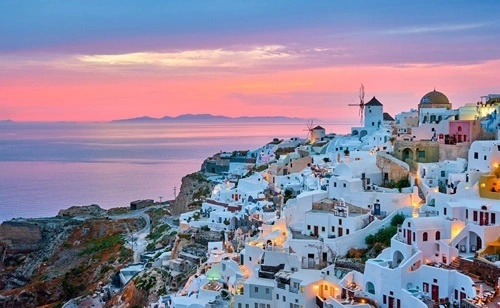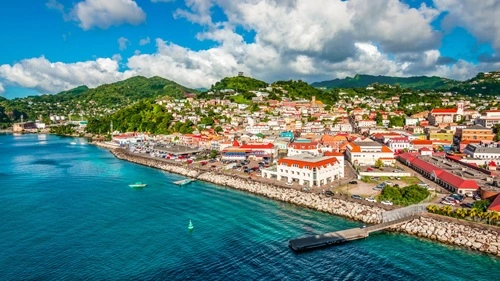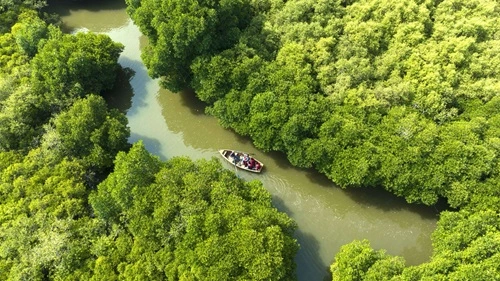Greece is renowned for its ancient history, beautiful islands, and cultural influence that extends around the world. From its sunlit shores to its classical ruins, there’s no end to what you can discover in this enchanting Mediterranean country. Whether you’re a traveler, a history buff, or just curious about Greece, here are some intriguing facts about Greece that showcase its unique charm and impact on the world.

1. The Cradle of Western Civilization
Greece is often called the “Cradle of Western Civilization” due to its immense influence on art, philosophy, politics, and science. It’s the birthplace of democracy, as ancient Athens established one of the earliest known forms of government by the people around 508 BCE. Pioneering figures like Socrates, Plato, and Aristotle laid the foundation of Western philosophical thought, and their ideas are still taught today.
2. Greece Has Over 6,000 Islands
While Greece itself is relatively small, its influence and beauty are vast. The country boasts more than 6,000 islands scattered across the Aegean and Ionian Seas, though only about 227 of them are inhabited. Santorini and Mykonos are among the most famous islands, but others like Naxos and Milos are equally stunning yet less crowded, offering a more serene experience. Each island has its own unique character, culture, and natural beauty.
3. Home to the First Olympic Games
The Olympics, as we know them, originated in ancient Greece. The first recorded Olympic Games took place in Olympia in 776 BCE and were held in honor of the Greek god Zeus. Ancient Greeks considered athletic competition essential to their culture, and the Olympics included events such as wrestling, boxing, and chariot racing. The modern Olympic Games were revived in Athens in 1896, and the Olympic flame, which burns continuously during the games, traces back to this tradition.
4. Greek is One of the Oldest Written Languages Still in Use
Greek is one of the oldest recorded languages, with written records going back over 3,400 years. The earliest evidence of written Greek dates to around 1450 BCE in a script called Linear B. Today, Greek remains an official language of Greece and Cyprus, and it has left a substantial mark on the English language. Many English words, especially in science and philosophy, have Greek roots, like “democracy,” “philosophy,” and “biology.”
5. Greece Has 18 UNESCO World Heritage Sites
Greece is home to 18 UNESCO World Heritage Sites, each representing significant cultural or natural value. Highlights include the Acropolis of Athens, the archaeological site of Delphi, and the medieval city of Rhodes. These locations are not only testaments to Greece’s rich history but are also pivotal to understanding the broader narrative of human civilization.
6. The Olive Tree’s Sacred Roots
Olive trees are a staple of the Greek landscape and have been cultivated in Greece for over 5,000 years. In fact, the olive tree is so cherished that Greek mythology tells of a contest between the goddess Athena and the god Poseidon to see who could give Athens the best gift. Athena’s olive tree symbolized peace and prosperity and was ultimately chosen, leading the city to be named after her. Today, Greek olive oil is considered some of the best in the world, prized for its high quality and rich taste.
7. One of the Sunniest Places in the World
If you’re after sunshine, Greece is the place to be! With an average of 250 sunny days per year, it’s one of the sunniest countries in the world. Summers are warm and dry, while winters are mild, especially on the islands and in coastal areas. The sunny climate not only draws tourists but also makes Greece ideal for agriculture, especially the cultivation of olives, citrus fruits, and grapes.
8. Greece Is Home to Europe’s Longest Gorge
The Samaria Gorge, located in Crete, is Europe’s longest gorge, stretching over 10 miles (16 kilometers). This UNESCO Biosphere Reserve attracts thousands of hikers each year who traverse its rugged landscape, winding through towering limestone cliffs and narrow passages. Known for its stunning natural beauty and rich biodiversity, Samaria Gorge is a must-see for adventurers visiting Greece.
9. Unique Greek Coffee Culture
Coffee culture in Greece is distinct, with traditions and customs that set it apart. Greek coffee, a strong brew made from fine grounds and boiled in a small pot called a “briki,” is popular among locals. However, frappe (a frothy iced coffee) and freddo espresso (cold espresso) are staples, especially during hot summer months. Greece has the highest per capita coffee consumption in the world, and visiting a local coffee shop is a daily ritual for many Greeks.
10. The Tradition of Breaking Plates
While it may sound odd, breaking plates is a traditional Greek custom, especially during celebrations like weddings and festivals. The practice is thought to symbolize good luck and ward off evil spirits, while also embodying a sense of joy and letting go of inhibitions. Though less common today, this custom still persists in some areas and adds a unique twist to Greek celebrations.
11. Greek Dance: A Heritage of Over 4,000 Years
Greece has a long history of traditional dance, with over 4,000 years of heritage behind it. There are more than 200 traditional Greek dances, each originating from different regions of the country. Sirtaki, a popular dance outside of Greece, was made famous by the movie Zorba the Greek but is actually a blend of slower and faster steps from various Greek dances. Dance is an essential part of Greek cultural celebrations, and it brings communities together during festive occasions.
12. Greece’s Orthodox Easter Celebrations
Easter in Greece is one of the most significant religious holidays, marked with unique and vibrant traditions. Holy Week, the final week of Lent, sees locals lighting candles, participating in processions, and attending midnight services. The tradition of “breaking eggs” symbolizes Christ’s resurrection, and in some regions, such as Corfu, locals throw clay pots out of windows, symbolizing the welcoming of spring and new beginnings.
13. Free Public Healthcare and Education
Greece provides its citizens with free public healthcare and education, though private options are also available. Public education includes primary, secondary, and higher education, with university students attending tuition-free public institutions. The healthcare system covers a broad spectrum of services, and Greece has consistently ranked well for healthcare quality compared to other countries with similar resources.
14. Inventors of Theater
The origins of theater are rooted in ancient Greece, where it emerged as part of religious festivals dedicated to Dionysus, the god of wine, fertility, and revelry. The Greeks developed the genres of tragedy and comedy, which continue to shape theater and film today. Playwrights like Aeschylus, Sophocles, and Euripides wrote timeless works that explore complex themes of human nature, morality, and destiny. Greek theaters, like the well-preserved Epidaurus, are still operational and offer a unique glimpse into ancient performance spaces.
Greece is more than its stunning landscapes and ancient ruins. It’s a country that has continuously adapted and thrived through millennia, leaving an indelible mark on global history, art, and culture. Whether through its historical sites, unique traditions, or natural wonders, Greece offers something for everyone, making it a fascinating place to explore and appreciate. With each visit, you’ll uncover layers of culture, heritage, and timeless beauty that reveal why Greece remains a beloved and enduring destination.



